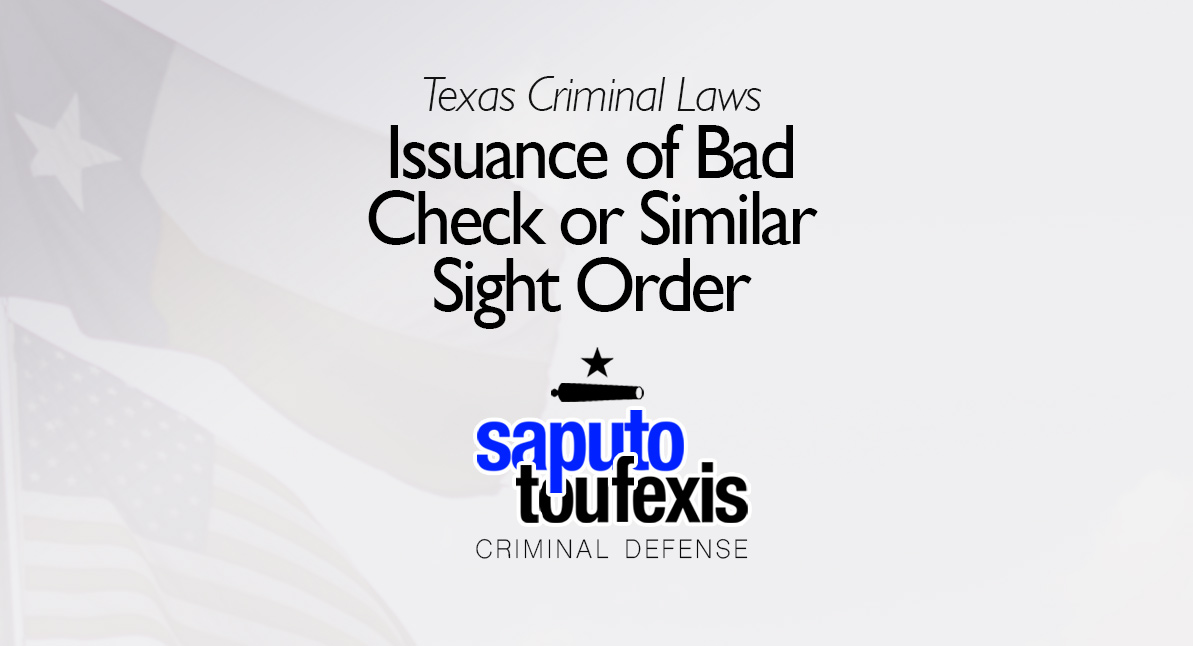The Texas Issuance of Bad Check or Similar Sight Order law gives police the right to arrest you if they believe you wrote a check for a payment knowing that the bank issuer did not have sufficient enough funds to cover the check.
FAQs about the
Bad Checks law in Texas
- What is the current Texas law about Issuance of Bad Check or Similar Sight Order?
- What is the penalty for a Texas Bad Checks offense?
- How can I be charged with an Bad Checks offense in Texas?
- What is the statute of limitations for Bad Checks in Texas?
- Can you get probation for Bad Checks in Texas?
- What level of crime is Bad Checks in Texas?
This is the Texas law that makes it illegal to write bad checks.
Have you been charged with Issuance of Bad Check or Similar Sight Order? Contact us today to discuss legal representation.
or Text or Call (888) 239-9305
The Texas legislature codified this criminal offense in Texas Penal Code Section 32.41. The legislature did not update this law in 2025. In fact, this law has not been amended since 2013.
The Penal Code classifies the Texas Bad Checks law under Title 7 “Offenses Against Property,” Chapter 32 “Fraud.” Learn more about the Texas offense of Issuance of Bad Check or Similar Sight Order below.
What is the current Texas law about Issuance of Bad Check or Similar Sight Order?
AV Preeminent Texas lawyer Paul Saputo provides the current law defining Issuance of Bad Check or Similar Sight Order in Penal Code Section §32.41, as follows:[1]
(a) A person commits an offense if he issues or passes a check or similar sight order for the payment of money knowing that the issuer does not have sufficient funds in or on deposit with the bank or other drawee for the payment in full of the check or order as well as all other checks or orders outstanding at the time of issuance.
What is the penalty for a Texas Bad Checks offense?
A conviction for Issuance of Bad Check or Similar Sight Order is punished by default as a Class C misdemeanor,[2] with a maximum possible fine under Texas state law of up to $500.
However, if the bad check passed if for child support, then a conviction for Issuance of Bad Check or Similar Sight Order in Texas is punished as a Class B misdemeanor,[3] with a maximum possible fine under Texas state law of up to $2,000 and jail time of up to 180 days.
How can I be charged with an Bad Checks offense in Texas?
You can be charged with Issuance of Bad Check or Similar Sight Order in Texas if the state’s attorneys believe that each of the elements of §32.41(a) as described in the section above have been met.
What is the statute of limitations for Bad Checks in Texas?
As a misdemeanor, Bad Checks charges have a two-year limitations period.[4]
Can you get probation for Bad Checks in Texas?
The Texas Code of Criminal Procedure allows both judges and juries to grant probation for Bad Checks, and judges are also allowed to accept deferred adjudication plea deals.[5]
What level of crime is Bad Checks in Texas?
The Penal Code classifies the punishment for Bad Checks as either a Class B or Class C misdemeanor, depending on the circumstances.
Learn more about the penalty range for this offense in the section above.
Legal References:
^1. Texas Penal Code §32.41. This law is current as of 2025.^2. Texas Penal Code §32.41(f)^3. Texas Penal Code §32.41(f)^4. See Code of Criminal Procedure 12.02(a)^5. See Chapter 42A, Texas Code of Criminal Procedure, Art. 42A.054, Art. 42A.056, Art. 42A.102










